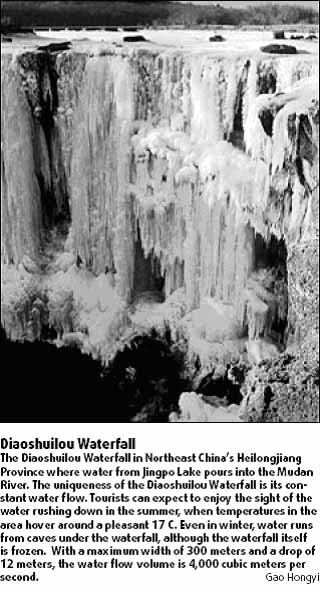 |
Yuntai Mountain World Geopark in Xiuwu County, Jiaozuo of Central China’s Henan Province, has witnessed considerable progress in geological preservation and sustainable development since a scientific management system was launched in 2001, said an official with the park’s administrative bureau. “We have to seek a balance between the geopark’s development and environmental protection,” said Han Yueping, director of the park’s administrative bureau. According to Han, the park has injected a hefty investment in and adopted a series of measures for environmental protection over the past years. Environmental protection With an increasing number of visitors, the exhaust from tens of thousands of vehicles has become the main source of air pollution in the park. The park thus bought 100 Euro-III sightseeing coaches, at a cost of over 40 million yuan, to establish a convenient and efficient internal traffic network in early 2005. In addition, it spent more than 100 million yuan on building the infrastructure and a comprehensive service area, including the main gate of the mountain area, the ticket office, a multi-purpose tourist service center and a large-scale, ecologically friendly parking lot. The geopark also introduced the advanced technology of water-force spray seeding to green up the mountain landscape along the park roads. Digitalization has played a crucial role in protecting geological resources, balancing tourist distribution in the park’s major scenic spots, and guaranteeing order. |
A further advantage that the 150,000-yuan digital system has brought to the geopark is the real-time monitoring of its ecological environment, which is sensitive, easily hurt and difficult to repair, and in the past required a huge amount of capital for its protection and improvement.
Upon the establishment of the intelligent monitoring system, the administration can keep an eye on the dynamics of the water, geology, forests and air in the park, gaining precise knowledge of the natural resources and disasters therein.
In 2002, the freshwater jellyfish, a rare species as precious as the giant panda, was found in the Zifang Lake inside the park. To protect this unusual species’ environment, the geopark regulated all of the businesses that may cause pollution, at the cost of several million yuan of economic return a year. It has forbidden the use of unclean fuel such as coal and set up environmentally friendly fast food restaurants. The operations of 117 mines have been suspended.
Outstanding efforts have also been made to protect and enlarge groups of rare animal species such as the Taihang macaque and leopard.
According to Han, farmland within the mountain with an area of 1,200 mu (80 hectares) has been converted into forest.
“We also invited foreign experts to take part in the grain-for-green project, with the aim of preserving the natural environment of the mountain,” Han said.
The park pays equal attention to the human-made landscape’s protection and preservation. According to the park, they will spend about 10 percent of the ticket income every year on preserving the landscape, ancient architecture, eco-system and precious animals and plants.
Mountain profile
Location: Yuntai Mountain is located in Xiuwu County in Jiaozuo in Central China’s Henan Province.
Attraction: The mountain area is characterized by its beautiful landscape and landforms, such as structural cuesta, flying waterfalls, faulted cliffs, quiet canyons, clear springs and white clouds.
Honors: The State Council approved Yuntai Mountain as a key national scenic spot in 1994.
In 2001, the Ministry of Land and Resources approved the mountain as a national geopark.
In February 2004, Yuntai Mountain National Geopark was evaluated by the United Nations Educational, Scientific and Cultural Organization (UNESCO) and became a world geopark.
In addition to these titles, the mountain has also received honors such as National AAAA Scenic Spot, National Forest Park, National Water Conservancy Scenic Spot and National Nature Reserve of Rhesus Monkeys.